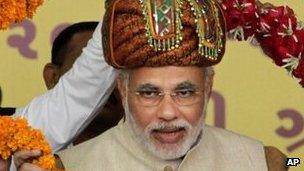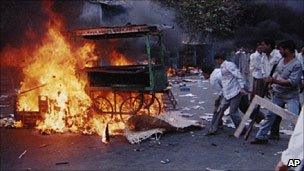India riots: Gujarat court ruling boosts Narendra Modi
- Published

Mr Modi denies any wrongdoing over the riots but has not apologised for them
The chief minister of India's Gujarat state will not have to appear before a panel investigating deadly riots there in 2002, a court has ruled.
The Gujarat High Court said there was no need to summons Narendra Modi before the Nanavati commission.
Mr Modi has been accused of allowing the riots but has always denied any wrongdoing.
More than 1,000 people, mostly Muslims, died in riots that erupted after 60 Hindus died in a train fire.
Key elections
The Gujarat High Court was ruling on a petition brought by the Jan Sangharsh Manch group, which represents some of the riot victims.
The group was calling for the court to order Mr Modi to present a deposition to the panel.
However, the judges said: "There is no need to summon or cross-examine Chief Minister Narendra Modi in the 2002 riot case."
It said it was up to the commission to demand a deposition. The commission had earlier rejected a petition calling for the deposition.
The Jan Sangharsh Manch can appeal to the Supreme Court.

The riots left more than 1,000 people, mainly Muslims, dead
Mr Modi has been dogged by allegations of turning a blind eye, or even backing the riots. He has always denied any wrongdoing but has not apologised for the riots.
Last year a senior police officer made a sworn statement to the Supreme Court that Mr Modi deliberately allowed the riots, saying Hindus should be allowed to vent their anger.
The new court order will be a boost for Mr Modi, whose Bharatiya Janata Party is engaged in important local elections across five other states, including Uttar Pradesh which has a key Muslim vote.
The 2002 riots were one of India's worst outbreaks of religious violence.
The cause of the train fire that sparked the riots is fiercely debated, although Muslims were blamed at the time. The train was carrying mostly Hindu pilgrims returning from the town of Ayodhya, itself a flashpoint for communal unrest after a mosque was razed in 1992 by Hindu hardliners.
Hindu mobs eager for revenge went on the rampage through Muslim neighbourhoods in towns and villages across Gujarat in three days of violence following the incident.
An inquiry commission set up by the Gujarat state government exonerated Mr Modi.
But the Supreme Court set up the Nanavati panel in 2008 after allegations the Gujarat government was doing little to bring those responsible to justice.
- Published13 October 2011
- Published19 September 2011
- Published9 November 2011